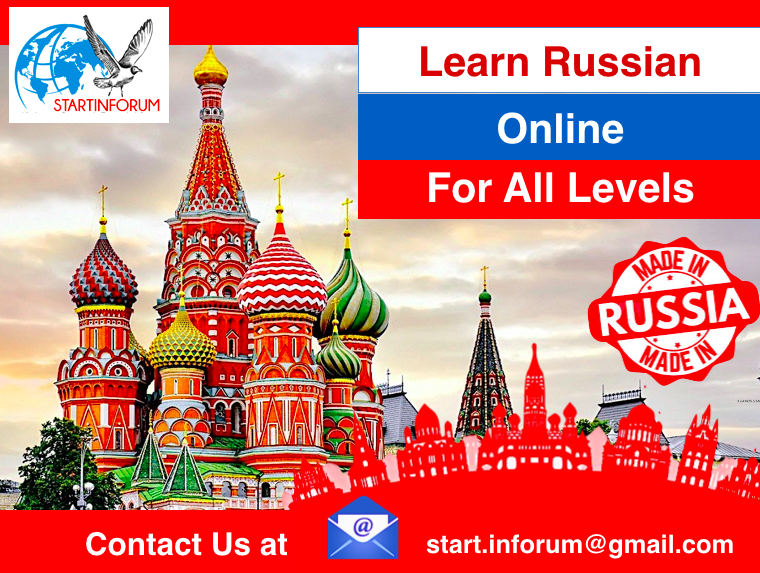
Dear Friends,
We would like to invite you to our Russian language courses for all levels!
The Russian language is really a fascinating world to learn.
Russian is a language which is very rich for its expressive means, vocabulary and embodied in very beautiful literature which got the worldwide recognition.
Not to say that Russian is one of the languages widely spoken in the world for the purposes of politics, business and trading.
Apart from the pragmatic purposes of learning Russian and using it in your education and professional career, it is also a good means to develop your own intellectual abilities, broaden horizons on analysing text structures, and, of course, learn more about the culture of the biggest country in the world.
If it is your very first attempt to start Russian, to your attention is our program “Russian Language From Zero”.
The program lasts 10 weeks which will be quite enough for you to learn basics of Russian, being able to read, write, participate in basic everyday conversations, manage with the short dialogues in the shops, streets, markets and so on when you will have a chance to visit Russia or some Russian speaking countries.
Being equipped with Russian, you will feel yourself comfortable in Russia, Belorussia, Ukraine, Kazakhstan, Uzbekistan, Georgia, Moldova, Azerbaydzhan, Armenia and other countries, not mentioning Russian communities in different countries of the world, such as Turkey, USA, Baltic countries, Latin America, etc.
We do our best to help our students to reach A1 and higher levels in Russian, making it more understandable and learnable despite huge variety of its linguistic forms and expressions which are very confusing for new learners.
Please take a closer look at the program of Russian Language from Zero and contact us to sign up for the course.
Russian Language from Zero
Russian Language from Zero is the program aimed to enhance the Russian literacy and Russian culture awareness.
The overall content for the program entails teaching basic Russian through interaction with different experts of the Russian Language.
The learning occurs in the natural settings of communication and interaction. The project ends up with the trip to the premisses of the university with the Russian Language as the education medium for the summing up intensive educational and cultural program.
The tentative content of the program covers the following topics to acquire:
Week 1.
- Reading: alphabet, letters (by the end of the class the students are able to read and write down simple words)
- Speaking: sounds, sound combinations, simple words. Conversation: greetings.
- Listening: sounds, sound combinations, simple words.
- Writing: sounds, sound combinations, simple words.
Week 2
- Reading: alphabet, simple words;
- Speaking: basic vocabulary, personal pronouns, Topic “Greetings”, plural form of nouns, genders;
- Listening: Basic vocabulary, personal pronouns, intonation in statements and questions;
- Writing: simple words.
Week 3
- Reading: simple words and sentences;
- Speaking: Basic sentences. Topics: Greetings. Acquaintance. Jobs. Listening: Basic vocabulary, personal pronouns, intonation in statements and questions;
- Writing: simple words and sentences – copying and dictating.
Week 4
- Reading: words, sentences, short texts and conversations;
- Speaking: Basic sentences. Topics: Greetings. Acquaintance. Numbers. Basic commands;
- Listening: Basic sentences, commands, short conversations.
- Writing: simple words and sentences – copying and dictating.
Week 5
- Reading: words, sentences, short texts and conversations;
- Speaking: Basic sentences. Topics: Greetings. Acquaintance. Numbers. Basic commands. Shopping. Question-Answer. Weather.
- Listening: Basic sentences, commands, short conversations.
- Writing: simple words and sentences – copying, dictating, writing on one’s own.
Week 6
- Reading: words, sentences, short texts and conversations;
- Speaking: Greetings. Acquaintance. Numbers. Basic commands. Shopping. Question-Answer. Family. Professions. Numbers;
- Listening: Sentences, commands, short conversations and texts;
- Writing: words and sentences – copying, dictating, writing on one’s own
Week 7
- Reading: words, sentences, short texts and conversations;
- Speaking: Greetings. Acquaintance. Numbers. Basic commands. Shopping. Question-Answer. My family. Professions. Daily routines. Time;
- Listening: Sentences, commands, short conversations and texts;
- Writing: words and sentences – copying, dictating, writing on one’s own.
Week 8
- Reading: words, sentences, short texts and conversations;
- Speaking: Greetings. Acquaintance. Numbers. Basic commands. Shopping. Question-Answer. My family. Professions. Daily routines. My house;
- Listening: Sentences, commands, short conversations and texts;
- Writing: words and sentences – copying, dictating, writing on one’s own.
Week 9
- Reading: words, sentences, short texts and conversations;
- Speaking: Greetings. Acquaintance. Numbers. Basic commands. Shopping. Question-Answer. My family. Professions. Daily routines. My house. My city;
- Listening: Sentences, commands, short conversations and texts;
- Writing: words and sentences – copying, dictating, writing on one’s own.
Week 10
- Summing up –
- Reading: words, sentences, short texts and conversations;
- Speaking: Greetings. Acquaintance. Numbers. Basic commands. Shopping. Question-Answer. My family. Professions. Daily routines. My house. My city;
- Listening: Sentences, commands, short conversations and texts;
- Writing: words and sentences – copying, dictating, writing on one’s own.
To find out more about this program and other Russian courses, to sign up for the course, please feel free to contact us at the mail start.inforum@gmail.com or by filling out the form below